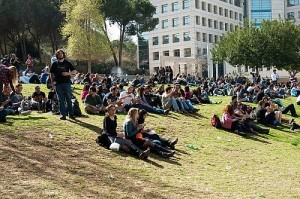2,000 New Students Started their Studies at Technion
 The academic year opened on October 13; the most popular faculties this year are Medicine, Electrical Engineering, Computer Science, Architecture and Mechanical Engineering; this year the academic reforms within the Technion’s study framework will continue, as too, the efforts to improve the quality of teaching
The academic year opened on October 13; the most popular faculties this year are Medicine, Electrical Engineering, Computer Science, Architecture and Mechanical Engineering; this year the academic reforms within the Technion’s study framework will continue, as too, the efforts to improve the quality of teaching
Throughout the 2013-14 academic year, the university will continue to implement the recommendations of the Committee charged with the task of examining the academic framework and the study load, headed by Professor Yachin Cohen from the Faculty of Chemical Engineering. Nine professors made up the Committee including the Chairman of the Student Association (known as ASAT in Hebrew), Danny Magner. According to the Committee’s recommendations, starting from the beginning of the current academic year, special resources will be allocated to improve teaching quality in the core courses, and reward outstanding teachers. Additionally, the “Good Start” program will be expanded on; the program aims to prepare students for Technion’s high academic demands, and to help them cope with their first year of study here. Within the framework of the program, students are offered online preparatory courses, to prepare them for the academic requirements in the core first year courses. In the following academic year (2015-16) the university will apply to the academic calendar a separation between the period of study and the exam period – the semesters will be shortened by 1 week (to 13 weeks) and in each semester one full vacation week will be given that will enable students to study for their exams with a peaceful mind. In addition, the university is also looking into alternative admission requirements, which will be based on the results of mathematics and physics exams instead of the Psychometric Entrance Test that is in practice today.
Technion President, Professor Peretz Lavie, said that a week before the start of the new academic year, “Technion took a significant step in fulfilling its vision – to be counted among the elite group of the world’s leading sci-tech universities – when it signed a memorandum of understanding to establish a Technological Institute in Guangdong Province, beside the University of Shantou in southeastern China. This initiative is very similar to the establishment two years ago, of the Jacobs Technion-Cornell Innovation Institute (JTCII) in New York, and to other joint international cooperation that the university is involved with. The US $130 million donation made by the Li Ka Shing Foundation, is the largest gift ever given to Technion, and it will be dedicated to promoting the wellbeing of Technion students and faculty on the university’s Haifa campus. Already in the upcoming academic year, student wellbeing will be at the center of the university’s action plans. I have set myself a goal to improve the overall atmosphere on campus, and together with Technion’s Senior Administration and the Student Association, will continue to work towards improving the quality of teaching and conduct towards students according to the recommendations of the Committee charged with the task of examining the academic framework and the study load at Technion.”
The total student body at Technion for the 2014-15 academic year is 13,000, of which 9,000 undergraduate students will study in 18 faculties.


